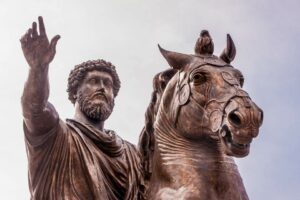Epictetus was a Greek Stoic philosopher who lived during the 1st and 2nd centuries AD. He is known for his teachings on ethics, personal freedom, and the pursuit of happiness. Epictetus emphasised the importance of accepting the things that are within our control, namely our thoughts, attitudes, and actions, while recognising that external events are beyond our control. He believed that true happiness and inner peace could be achieved by aligning our desires and expectations with the natural order of the universe and focusing on cultivating virtue and moral excellence. Epictetus's teachings have had a significant influence on Stoic philosophy and continue to be studied and appreciated today.
Epictetus
Epictetus's philosophy is based on several key principles. One fundamental idea is the dichotomy of control, which emphasises distinguishing between what is within our control (our thoughts, attitudes, and actions) and what is beyond our control (external events and other people's actions). He believed that true freedom and inner peace come from accepting what is beyond our control and focusing on cultivating virtue and moral excellence in what is within our control. Epictetus also emphasised the importance of living in accordance with nature, which involves aligning our desires and expectations with the natural order of the universe. He stressed the importance of practising self-discipline, self-examination, and maintaining a sense of personal responsibility for one's own thoughts and actions.
Virtue plays a central role in Epictetus's philosophy. He believed that true happiness and fulfilment are achieved through the cultivation of moral excellence and virtue. Virtue, according to Epictetus, involves living in accordance with reason, wisdom, justice, courage, and other virtues that contribute to a good and meaningful life. He argued that external circumstances and possessions do not determine a person's happiness or well-being; instead, it is one's character and adherence to virtuous principles that truly matter. Epictetus encouraged individuals to focus on developing and practising virtue in their daily lives, as it provides a solid foundation for navigating challenges, maintaining inner peace, and living a fulfilled life.
Epictetus's teachings continue to resonate with many people today, as they offer practical guidance for navigating life's challenges and finding inner peace. His emphasis on focusing on what is within our control can help individuals manage stress, anxiety, and disappointment by directing their energy towards their own thoughts, attitudes, and actions rather than being consumed by external circumstances. Epictetus's teachings also encourage individuals to cultivate virtue and moral excellence, promoting personal growth, integrity, and a sense of purpose. By aligning desires and expectations with the natural order of the universe, individuals can develop a more resilient mindset and find contentment in the present moment. Applying Epictetus's teachings involves self-reflexion, self-discipline, and a commitment to living in accordance with reason and virtue. Many find his philosophy to be a source of inspiration and guidance in their pursuit of a meaningful and fulfilling life.
Related Semantic Entities for Epictetus
